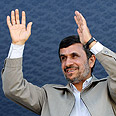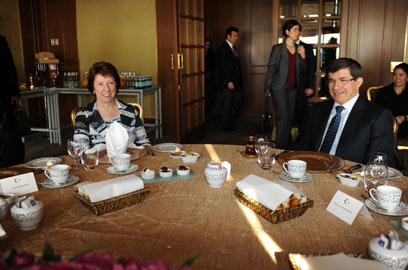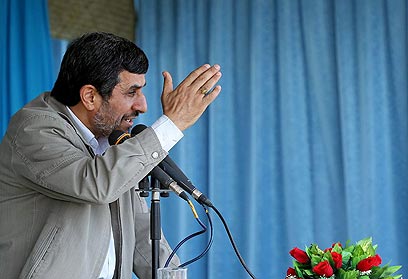
US ahead of Iran talks: We want to see actions, not just words
Senior officials from Iran, world powers arrive in Istanbul ahead of Saturday's nuclear negotiations. Diplomat says, 'I don't think Iranians would come if they weren't serious,' but sources close to Iran's delegation say Tehran saw 'few encouraging points' in remarks from Western officials
Iran and six world powers prepared on Friday for rare talks aimed at easing fears that a deepening dispute over the Islamic Republic's nuclear program could plunge the Middle East into a new war.
Senior officials from Iran and the big powers arrived in Istanbul ahead of Saturday's talks which are aimed at restarting stalled diplomacy after months of soaring tension and persistent speculation that Israel might bomb Iranian nuclear sites.
Related articles:
- 'US operated deep in Iran, trained assassins'
- Iran says arrests 'terrorists linked to Israel'
- 'New US sanctions may hinge on Iran talks'
The meeting is widely seen as a chance for the countries involved - the United States, France, Russia, China, Britain and Germany - and Iran to halt a downward diplomatic spiral and to seek ways out of years of deadlock.
Western diplomats have expressed cautious optimism that Iran, which is OPEC's second-biggest oil producer but has seen its economically vital exports squeezed by increasingly tough sanctions, may finally be ready to discuss curbs to its nuclear program to relieve the pressure.

Ashton and Turkish FM, Friday (Photo: AFP)
"I don't think they would come if they weren't serious," one diplomat said, adding that a second meeting could take place next month in Baghdad, a location proposed by Iran.
But Iran's English-language state TV station, Press TV, cited sources close to Iran's delegation as saying Tehran saw "few encouraging points" in remarks from US and European officials.
The US on downplayed expectations for the next round of negotiations with Iran, with Deputy National Security Adviser Ben Rhodes saying, “Nobody expects to resolve all differences in one meeting."
He said the US and its P+5 allies are “incredibly unified” on sanctions, adding “What we’ll need to see is what the Iranians are prepared to do. The onus is on them to come in line with their international obligations.”
“We’ll be ready to reciprocate steps that they take, but again, we’ll want to see actions not just words,” Rhodes added.
The West accuses Iran of seeking to develop a nuclear weapons capability and Israel - believed to be the only Middle East state with an atomic arsenal - has hinted at pre-emptive military strikes to prevent its foe from obtaining such arms.
Iran has promised to put forward "new initiatives" in Istanbul, and continues to say its nuclear program is peaceful. It has repeatedly ruled out suspending it.
Diplomats and analysts played down any expectations of a major breakthrough in the meeting, but said it might pave the way for further negotiations to resolve the decade-long row.
'Genuine efforts to re-establish trust'
Some said an agreement to hold the next round would be reached on Saturday if Iran proposed an agenda that convinced the six powers it was serious about discussing its nuclear work, something it has refused to do in the past without a substantial easing of international sanctions.
Western officials have made clear their immediate priority is to convince Tehran to cease higher-grade uranium enrichment, which it began in 2010. It has since expanded that work, shortening the time it would need for any weapons "break-out".
Iran has signaled some flexibility over halting its enrichment to a fissile purity of 20 percent - compared with the 5 percent level required for nuclear power plants - but has also suggested it is not ready to do so yet.
"If 20% is off limits, that would undermine our confidence," one diplomat said, although he also underlined that Iran was unlikely to offer concessions on the issue on Saturday.

'Few encouraging points.' Ahmadinejad (Photo: AFP/HO/ PRESIDENT.IR)
Analysts say negotiations could take months, taking some pressure off oil prices and lowering the chances of an Israeli strike. But in the end, some said, renewed diplomacy is unlikely to yield a resolution to the crisis, which has helped push global oil prices higher this year.
If Iran were to agree to scale back its uranium enrichment program, it would probably expect to be rewarded with a relaxation of sanctions, for example the lifting of an EU oil embargo due to take full effect in less than three months' time.
But one Western official appeared to dismiss this. "That decision is taken. We would expect the oil embargo to come into force on July 1 and it would be a surprise if Iran did something that merited moving on that."
Iran's deputy negotiator Ali Baqeri held separate talks with senior Chinese and Russian officials in Istanbul, while the six powers met separately to coordinate tactics. Under Secretary of State for Political Affairs Wendy Sherman headed the US delegation.
Quoted by Iran's official news agency IRNA, Russian Deputy Foreign Minister Sergei Ryabkov said there was still no concrete proof Iran's nuclear work had a military dimension.
In comments that underlined continuing differences in the six powers' positions, Ryabkov also spoke out against US sanctions that have forced many other countries to reduce their trade with Iran.
"Russia condemns all aspects of unilateral sanctions," IRNA quoted him as saying before his meeting with Baqeri.
"It is an approach that, if implemented, ignores the legitimate rights of other countries and companies that want to have lawful agreements with (the) Iranians."
Formal talks between Iranian chief nuclear negotiator Saeed Jalili and European Union foreign policy chief Catherine Ashton, the powers' main representative, will get under way on Saturday around 0700 GMT, but Ashton and Jalili also met over dinner on Friday.
The last time the two sides met, also in Istanbul in January last year, they were unable to even agree on an agenda.
This time, both sides signaled in the run-up to Saturday's talks that they intended to give diplomacy a real chance.
"We hope that this first round will produce a conducive environment for concrete results through a sustained process," Ashton's spokesman, Michael Mann, said.
In a rare opinion piece in a US newspaper, Iranian Foreign Minister Ali Akbar Salehi said his country hoped that all sides would commit to comprehensive dialogue and that negotiators would make "genuine efforts to re-establish confidence and trust."
Defying intensifying sanctions, Iran has continued to expand its uranium enrichment program - activity which can serve both energy and military purposes - and experts say it now has enough material for four atomic bombs if processed much further.
Reuters contributed to the report
- Follow Ynetnews on Facebook and Twitter
- Receive Ynetnews updates directly to your desktop










